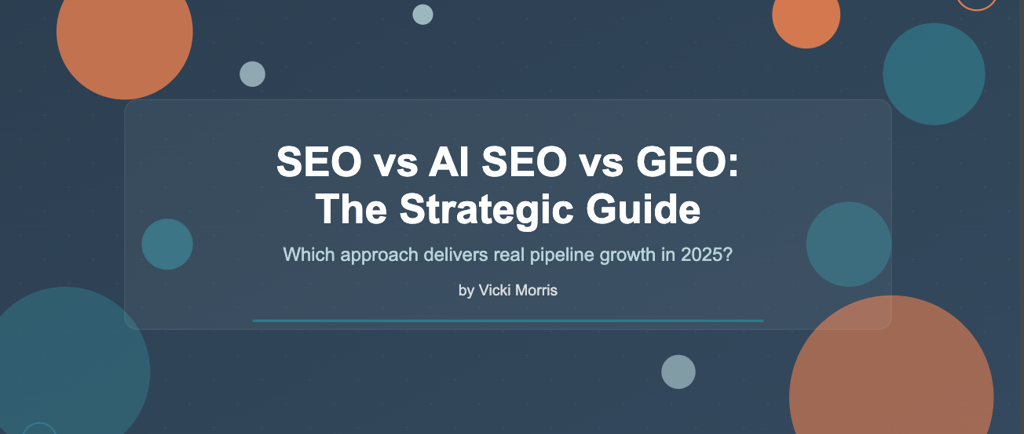SEO vs AI SEO vs GEO: The B2B Tech Leader's Strategic Guide
B2B tech companies are losing pipeline as traditional SEO declines 15% year-over-year. With 72% of buyers now using AI tools for research, most marketing strategies are optimizing for yesterday's search landscape. This strategic guide compares Traditional SEO, AI SEO, and Generative Engine Optimization (GEO) approaches, showing why companies implementing GEO see 35% pipeline growth by capturing high-intent buyers in AI-generated answers. Learn which approach fits your business context and why being cited as an authority is the new currency of digital visibility.
Vicki Morris
7/27/20253 min read


Which approach delivers real pipeline growth in 2025?
Executive Summary
The Challenge: Traditional SEO is declining (-15% year-over-year) as AI-powered search transforms B2B buyer behavior.
Key Insight: 72% of B2B buyers now use AI tools during research, making traditional keyword optimization increasingly ineffective.
Strategic Options: Three distinct approaches - Traditional SEO, AI SEO, and GEO - each serve different business contexts.
Bottom Line: Companies implementing GEO strategies can see 35% pipeline growth by optimizing for AI citation and authority rather than just Google rankings.
B2B tech buyers are increasingly skipping brand websites and getting their answers directly from AI-powered search tools. While most companies debate whether to stick with traditional SEO or adopt AI SEO tools, the real game has already moved to Generative Engine Optimization (GEO).
If your brand isn't showing up in AI-generated responses, you're invisible - no matter how good your Google ranking is.
The Three Strategic Approaches
Traditional SEO: Foundation Under Pressure
What it is: Optimizing for Google and Bing rankings through keywords, backlinks, and meta tags.
Current reality:
-15% year-over-year decline in pipeline impact
47% of Google searches now show AI overviews that cover 75% of mobile screens
Even #1 rankings may not get seen
Best for: Early-stage companies with limited budgets in simple, non-technical markets Time to ROI: 6-12 months
AI SEO: Faster Execution, Same Old Game
What it is: Using AI tools to improve traditional SEO tasks - keyword research, content creation, technical optimization.
Current reality:
Flat performance (±5% change) because it still optimizes for traditional search
72% of B2B buyers now use AI tools during their journey
More efficient execution of outdated strategy
Best for: Teams wanting efficiency gains while maintaining current approaches Time to ROI: 3-6 months
GEO: The Strategic Evolution
What it is: Optimizing content for AI-driven search engines (ChatGPT, Gemini, Perplexity, Google AI Overviews) that generate direct answers rather than ranked links.
Current results:
+35% pipeline growth by capturing decision-stage buyers
2.3x faster conversions vs traditional approaches
30-90 day ROI timeline
Best for: AI-first industries, startups competing against incumbents, technical B2B companies Key advantage: Dominates AI-generated answers and converts high-intent buyers
Why This Shift Matters for B2B Tech
Buyer Behavior Has Changed:
72% of B2B buyers use AI tools during research - 45% at decision stage
46.5% of AI-cited pages rank outside Google's top 50
Traditional SEO metrics no longer predict visibility
AI Is the New Gatekeeper: B2B buyers use AI tools for research, and these tools cite content directly in answers. If your content isn't structured for AI understanding, you're invisible to decision-makers.
Traditional SEO approach:
Keyword optimization and density targets
Meta tags for search engines
Backlink strategies
Hope for page one rankings
GEO approach:
Clear, structured data: Tables, bullet points, scannable formats
Expert commentary with attribution: Named quotes and credentials
Entity optimization: Schema markup for AI understanding
Q&A sections: Direct answers to buyer questions
Citation-worthy elements: Original research and authoritative sources
The Competitive Advantage
Most B2B tech companies are still optimizing for 2019's search landscape while buyers have moved to AI-powered research. This creates massive opportunity for early GEO adopters to establish authority before competitors catch up.
First-mover advantages:
Authority establishment in AI responses for your domain
Technical query domination where limited GEO content exists
Pipeline growth while competitors struggle with declining SEO performance
Industry opportunities:
Cybersecurity: Technical compliance and threat landscape queries
Fintech: Regulatory and implementation discussions
AI/ML: Rapidly growing segment of AI-curious buyers
DevOps/Cloud: Technical longtail queries driving high-intent buyers
Making the Strategic Choice
Choose Traditional SEO if:
Early-stage with limited budget
Simple, non-technical market
Can wait 6-12 months for uncertain results
Choose AI SEO if:
Want efficiency gains in current approach
Team resistant to strategic change
Satisfied with flat performance
Choose GEO if:
Compete in B2B tech markets
Buyers use AI tools for research
Need ROI within 90 days
Want competitive advantage before market catches up
Understanding the strategic differences between traditional SEO, AI-enhanced SEO, and GEO approaches helps companies choose the right mix of tactics for their situation and market context.
The Bottom Line
Traditional SEO gets you found in yesterday's search landscape. AI SEO helps you do traditional SEO faster. GEO gets you cited and trusted in the AI-driven answers that B2B tech buyers rely on today.
The shift from SEO to GEO isn't optional - it's inevitable. The question is whether you'll lead the transition or scramble to catch up when traditional SEO performance continues declining.
In the AI-search era, being found isn't enough. Being cited as an authority is the new currency of digital visibility.
About the Author
Vicki Morris is an award-winning strategic marketing executive with 25+ years of experience scaling B2B tech companies. Recognized by Marketing Sherpa, GDUSA, and Sun Microsystems for exceptional results, she has launched 40+ products globally and managed teams across 8 countries. Currently seeking VP Marketing opportunities with AI-focused companies, Vicki combines deep strategic thinking with hands-on execution expertise, specializing in helping B2B tech companies navigate the AI marketing revolution.
Connect:
Want to create exceptional AI marketing results with purpose?
© 2025. All rights reserved.


Seeking remote CMO/VP Marketing opportunity with innovative AI/SaaS B2B company. Willing to travel as needed.
